Denemek ALTIN - Özgür
Acidosis can be managed
Stockfarm
|July 2021
The saying goes that too much of a good thing is not good at all. In the case of acidosis, this is indeed true. Acidosis is a common occurrence in animals exposed to an abundance of palatable feed and that had ingested too many highly digestible carbohydrates (or sugar).

According to Dr. Schabort Froneman of Zoetis, the most common cause of acidosis is the sudden excessive intake of grain, meal or crushed maize, silage (especially if poorly fermented), by-products of brewer’s grain, potatoes, apples, or peaches (high sugar content), bread or molasses.
He explains that the micro-organisms in the rumen of animals grazing on grasslands are not adapted to digest energy-rich carbohydrates. This excess of digestible carbohydrates sets the scene for the wrong type of micro-organisms to proliferate.
Consequences and complications
Acidosis has several unpleasant consequences. Lactic acid burns the rumen wall and causes inflammation of the rumen. The lactic acid is consequently absorbed into the bloodstream, in turn leading to metabolic acidosis.
Water from the body also collects in the rumen and can lead to dehydration. Often, rumen motility will stop completely and, along with an increased rate of fermentation in the rumen, will lead to bloat. Adding to the negative effects is the production of an enzyme that breaks down thiamine, leading to a vitamin B1 deficiency and nervous system symptoms.
If the animal is not treated at once, bacterial or fungal infection of the rumen, liver, and even lung abscesses can occur. Finally, upon death, certain bacteria release a toxin that causes shock, organ damage, and laminitis.
Bu hikaye Stockfarm dergisinin July 2021 baskısından alınmıştır.
Binlerce özenle seçilmiş premium hikayeye ve 9.000'den fazla dergi ve gazeteye erişmek için Magzter GOLD'a abone olun.
Zaten abone misiniz? Oturum aç
Stockfarm'den DAHA FAZLA HİKAYE
Stockfarm
Trust and muffins lead the way
In any business, communicating in silos is the main cause of issues among managers. With only three of us managing things, myself on sheep, Gert on vehicles and Mbali on payments, breaking through our silos is easy. Twice a week we hold short morning meetings to report progress and problems towards our goal of turning grass into sheep for profit.
2 mins
December 2025
Stockfarm
Santa's new team
Last December, we warned Santa Claus of the perils of visiting South Africa with his team of reindeer. We cautioned him about the biological hazards his reindeer might bring into the country, and the import tariff issues he might encounter when trying to bring in all those gifts. We also elaborated on the heat and other environmental challenges his team might face. But we also told him about our friendly farmers and the braais he might be invited to, complete with a beverage of his choice.
3 mins
December 2025
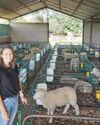
Stockfarm
The effect of iucerne hay quaiiiy on feedlot lambs
Lucerne hay is one of the most widely used roughage sources for ruminant diets, largely due to its reputation for providing high-quality nutrition. Important considerations for producers who use lucerne hay in their feed programme include assessing the true value of lucerne hay, determining the most suitable grade for specific feeding purposes, considering its cost, and balancing these factors against optimal feedlot performance.
3 mins
December 2025
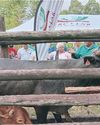
Stockfarm
Imfuyo-yami Ingumcebo Wami: Livestock as a legacy of wealth and wisdom
In the heart of KwaZulu-Natal, under the warm sun and the watchful gaze of the rolling hills, the Hlawini Community Hall in Umfolozi Local Municipality came alive with the spirit of unity, learning, and tradition. The occasion? The Umfolozi Livestock Farmers' Information Day, held under the banner of the Agricultural Research Council's (ARC) Kaonafatso ya Dikgomo (KyD) project, a national an initiative aimed at empowering communal livestock farmers through knowledge, technology, and sustainable practices.
3 mins
December 2025
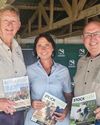
Stockfarm
Celebrating the 2025 Komga Agricultural Show
This year's Komga Agricultural Show, energised by the arrival of summer and filled with festive stalls, was a hive of activity. The grounds came alive with live music, a poultry exhibition, the familiar sounds of cattle and sheep in the pens, displays of horsemanship, and top-quality technology and implements on show.
2 mins
December 2025
Stockfarm
DSA reaches new milestone on the road to excellence
The Dairy Standard Agency (DSA) has enjoyed an exceptional 2025 so far, marking two major achievements that underscore its ongoing pursuit of excellence.
3 mins
December 2025
Stockfarm
Samic: Protector of red meat quality
If you thought the South African Meat Industry Company (Samic) is just about carcass competitions, think again. Fact is, the company plays a pivotal role in South Africa's meat supply chain, upholding rigorous standards of quality, safety, and transparency from the farm gate to the plate.
3 mins
December 2025
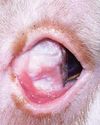
Stockfarm
Wireworm management in small stock
Years of indiscriminate dosing have eliminated weaker wireworms, allowing resistant populations to dominate and spread through flocks. Wireworms typically hatch following good rains and warm nights. When larvae move up the green grass, they are ingested by grazing sheep. About 20 days later, the worms begin sucking blood, leading to anaemia and, in severe cases, death.
2 mins
December 2025

Stockfarm
Back to basics at the 2025 LRF Stockman School
The 17th Annual LRF Stockman School, hosted by the Livestock Registering Federation (LRF), kicked off with great enthusiasm at the Aldam Holiday Resort and Conference Centre in the Free State. Held over three days, the event brought together leading experts from a range of fields who met everyone's expectations by addressing relevant and timely topics head-on.
7 mins
December 2025
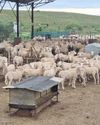
Stockfarm
Vertical gains in the lambing pen: It's not just about the numbers
In a world where rising input costs and increasing consumer demands play a decisive role, it has become more important than ever for red meat producers to raise lambs that not only benefit the producer but also add value throughout the entire supply chain.
4 mins
December 2025
Translate
Change font size

